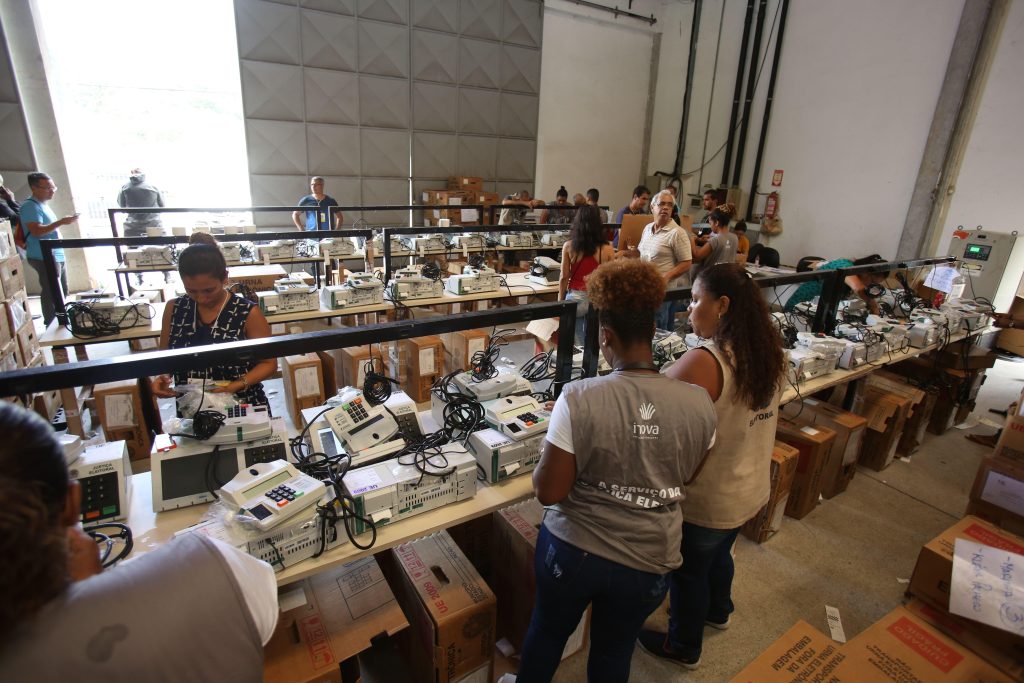In a few days time, Brazilians head back to the polls to vote in round two of the presidential elections. Historically popular former president Lula da Silva is running against incumbent Jair Bolsonaro. It’s a hotly contested showdown illustrating a deep divide in Brazilian society that unfortunately mirrors political conflicts in many parts of the world at the moment – conflicts that are deeply entwined with an eroding sense of trust in the machinery of democracy.
In the case of Brazil, that machinery is literal and it is under direct attack. Bolsonaro and others like him around the world continue to cast doubt on the machines citizens use to cast their votes, and the impact couldn’t be more serious.
Trust is an essential component of democracy. A stable democracy is impossible without it. Yet it is excruciatingly difficult to build and devastatingly easy to undermine.
Trust in the System
In place of a utopian universal trust in our fellow citizens stands trust in a democratic system as a whole – a set of rules, institutions and processes, providing checks and balances to ensure that the outcome, whatever it may be, can be generally (and often begrudgingly) accepted by a plurality.
Yet that beautiful mess of good ideas is incapable of operating in the abstract, without people and things in the middle – People to operate polling stations. People to count votes. People everywhere, but also paper, and now, more frequently, machines.
Voting machines were initially introduced to Brazil in 1996 in order to speed the process up. A goal which was emphatically achieved: Processing times between 1989 and 2002 dropped from 9 days to 12 hours.
Other major goals included reducing fraud and increasing trust and accessibility for the 14% of the population that was illiterate at the time. Prior to implementation, Brazil’s electoral system had been chaotic and vulnerable to both error and abuse – illegible names, marks in the wrong place, ballot stuffing, etc.
In recent years however, these issues have all but evaporated. Voting machines have been a resounding success. Yet technology, as we have seen, is not immune from distrust or error.
Doubt in the Machine
Anyone with any experience using a computer understands that there can be problems.
We are also acutely aware of the dangers posed by hackers and other threats to digital security. So it’s really no wonder or surprise that narratives against the apparent reliability of voting machines are so prolific and successful. It’s so easy to envisage in action.
A shadowy figure uploads a virus. A corrupt election official inserts a thumbdrive. Or perhaps a ‘simple’ bug flips a vote. The mental images, however disjointed from practical reality, are there, ready to go, and they have been wound up by a campaign of baseless accusations.
In Brazil this stems from incumbent president Jair Bolsonaro. Ever since the buildup to his election victory in 2018, he has been making extensive claims of fraud that range from generalised interference, hacking, altering the source code, and pre-programming machines to issue “null votes”, all the way through to “secret” vote counting rooms.
He also claims that the system can’t be audited (while bizarrely demanding audits).

Each of these claims can and has been fact checked and ruled baseless, not only by international media, but also by domestic courts, specially purposed electoral courts and perhaps more pointedly, bodies set up specifically to conduct ongoing audits and respond with more detailed audits when claims of fraud are made.
One such audit was carried out in 2014. No evidence of fraud was found.
What’s more, the machines are regularly cracked open and code made transparent in order to hunt for vulnerabilities. A random selection of voting machines is even sampled every election to check for tampering. No evidence of fraud has been found.
The system, apparently, works.
Lies about voting machines – poison in the well of democracy
Yet we are so ready to distrust. We’ve been primed for it. And it’s not without a touch of irony that the wider democratic process itself – driven towards antagonism as it so often is –carries some responsibility.
Painting each other into extremes. Sowing the seeds of its own destruction.
There is a certain kind of politician who feeds on this. The type who weaponise doubt and distrust, doing lasting damage to democracy for their own short-term gain, instead of working to strengthen and reinforce it
In Brazil, it’s Bolsonaro. But we all know he is but one of many.
Since well before the 2016 elections in the US, Donald Trump has been callously undermining the legitimacy of elections with claims of fraud so utterly divorced from reality that even his own lawyers have admitted there’s no basis in fact.
In January 2021, Trump’s lawyers Rudi Giuliani and Sydney Powell, along with news networks Fox News, Newsmax and OANN, were all hit with billion dollar lawsuits for promoting and broadcasting conspiracy theories about Dominion Voting Systems – something about ANTIFA, George Soros and deceased former Venezuelan President Hugo Chavez.
It would seem absurd if it wasn’t so deadly serious.
However, never one to let the truth or a lack of evidence get in the way of a good opportunity, it has now been two years since Trump was voted out of office and he is still out there prattling on – and asking for money.
It feels like democracy is being turned in on itself. Voting machines are just a scapegoat. The latest and perhaps easiest target.

No Really – Trust in the System
It’s not unreasonable to distrust technology. It is however important to look at each case individually and examine some of the assumptions we make along the way.
One of the first assumptions to examine is that adding voting machines to the mix brings with it a whole lot more opportunities to commit fraud.
Nevermind that most types of fraud (malicious code, tampering, etc) involve people at some stage or another. You know, those things that traditionally handled the votes before the machines came along.
A very large part of our distrust in technology is just an extension of our distrust in each other. And that’s a much bigger problem – one that needs democracy to stick around in order to have any hope at all of being addressed.
Another assumption is that voting machines exacerbate the chance for error. There’s a fear of the faulty machine.
It’s the same base emotion that leads people to a fear of flying, despite it being indisputably the safest way to travel. The technology, as imposing as it may be, leaves a record that can be examined. Any issue that occurs can be learned from and avoided in the future.
Overall, the result is a safer, more reliable experience.
Yet let’s not use this as an opportunity to undermine a human moderated election either. The issue here is not the mechanism – whether it be ballots cast on paper and counted by hand, or cast on keyboards and counted by code.
The issue is the cynical intent to undermine the system.
Technology at the heart of the democratic process has come under a repeated and consistent campaign of fire from those who aspire to power unrestrained by inconveniences like rule of law and civil authority. But then again, so have mail-in ballots. So have the people who work polling stations, the courts, law enforcement and the media.
If this was a conversation about transport, the Jair Bolsonaros and Donald Trumps of the world would be screeching about airline disasters. Not because air travel is genuinely unsafe. Not even because they’d personally be better off if everyone walked. But because chaos is a ladder, and because sowing distrust in institutions helps them break and remake them in their own interest.
If it’s not voting machines, it’s something else. Anything to distract from the core issue. Sowing distrust is an easy game to play – and that’s exactly what makes it so dangerous.
At the end of the day, voting machines work. They’re great, provided they’re backed up by best practice. They reduce handling (and handling errors), deliver faster results, wildly improve accessibility and they can (and should regularly) be audited.
Sounds like a good idea to me.
